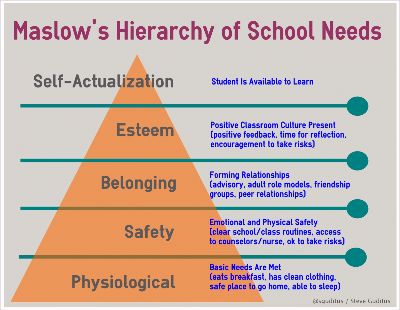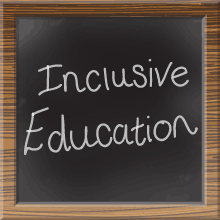A student’s ability and performance in education isn’t a simple issue of motivation. Barriers to learning are the barriers which stop students from achieving their goals.
Barriers to learning can be common or may be a one-off associated to individual students.
This blog post takes a look at common barriers to learning and how to overcome then.
Common barriers to learning
Barrier 1: Motivation
A student’s learning ability depends largely on motivation. An individual’s desire to achieve results and improve knowledge (regardless of material being studied) is one of the most important factors in a student’s ability to learn.

The above table is based on Maslow’s Hierarchy of Needs. These are all essentials needs that we seek in order to learn. Self-actualisation appears at the top of this pyramid. A lack of motivation is a major barrier to student’s learning and without a desire to succeed, students often end up doing the bare minimum amount of work in the classroom. A lack of motivation can often result in students going through the motions of learning and not retaining information.
Barrier 2: Social and cultural barriers
The ability of a child to interact with peers has significant impact on progression in the classroom. The very act of learning in a classroom involves interacting with other students / friends to talk through problems and find solutions.
Discussing lessons with other students is vital as it helps students realise their own strengths and weaknesses and enables them to improve their knowledge gaps, learning directly from their classmates.
Barrier 3: Emotional factors
The encouragement received from teachers, parents and friends play a crucial role in learning.
If a student adopts a mindset of ‘always trying their best’ and learning from past failures, they’ll generally have a positive outlook. As a contrast, if a student’s internal voice is always telling them that they aren’t good enough and there is no point in trying, they are more likely to underachieve.
A student’s emotional wellbeing impacts their ability to do well at school. Students who lack confidence and are afraid to take educated guesses could have emotional issues that are affecting their learning. There can be a number of emotional factors at play in a student’s learning including a fear of embarrassment, doubt and inadequacy, all of which can lead to self-sabotaging emotional states.
Generally speaking, negative emotions can be reduced by setting expectations, focusing on the positives and setting goals for the future.
Barrier 4: Personal issues
Students can encounter personal issues that affect their learning. Students with diagnosed learning difficulties like autism or Asperger’s syndrome will find certain elements of learning more challenging than others. Similarly, students with learning impairments like dyslexia may find that their personal barriers hinder their progress at times.
Factors such as transport, location, language and access, on a practical level, can all present blocks to learning for some students. Some pupils who do not speak English as their first language may find following instructions more difficult than native English speakers.
How to eradicate barriers to learning
There are a number of steps which your school can take to overcome barriers to learning:
Environment: In a noisy environment, learning should be difficult for the learner – the classroom environment should be without noise. To reinforce this, visual prompts could be placed around the classroom.
Routine: This is vital to alleviate confusion and to give some security to students. When routines have to be broken, ensure that pupils are prepared and that someone is available to talk them through what is going to happen.
Instructions: These should be short and precise. Trainers should ensure that learners know he/she is addressing them and not someone else. One instruction should be given at a time to avoid confusion.
Respect: Young people should not be forced to work in pairs or groups if they are uncomfortable in that situation. Respect should be shown for differences and be aware of the social networks of the room where the learning session will be conducted.
Non-curricular activities: When the session will be running, problems often arise at break time or lunchtimes. It is during these times when computer clubs, organised games and mentors offer valuable support and can also provide some training in social skills that will help pupils to come with new situations.
Improving communication skills: Good communication skills can be better to learn anything. In this case, the teacher should use language understandable by pupils.
ICT skills: For teachers to successfully conduct the learning session, the trainer or the organisation should use the ICT and visual presentation facilities. If pupils are competent with ICT themselves it gives them greater confidence to complete their work.
Concentration: All learners should be concentrating on their learning session. One-to-one learning can be arranged to talk to children about their work. Listening in these moments is essential in order for pupils to understand their work and feedback.
Culture: Every country and every school has a different culture. Learners can take steps in order to help to prepare them if moving country.
Timely feedback: This is important for any type of learning. If you are a teacher you can make your presence known by getting involved early and asking questions to keep discussion going. Learners should be aware of their progress throughout the course. Barriers to learner discussed above can manifest themselves in different ways and only become obvious when learning breakdown occurs when learners ‘drop out’ of the system or when the excluded become visible.
How EDClass can help
EDClass aims to break barriers to learning by welcoming all types of students onto the platform enabling them to reach their potential learning in their own comfortable learning environment.
The platform caters for:
- Mental health problems
- Long-term illness
- In isolation
- Excluded
- 6th-day provision
- Home educated
- Persistently absent
- School phobic
- Vulnerable
- At risk
- Foundation and functional skills learners
- Disengaged
- Demotivated
- Low-level literacy or numeracy
To obtain more information or a free online demonstration then fill visit our page here. Alternatively, you can call the team on 01909 568 338 or email mail@edclass.com.









